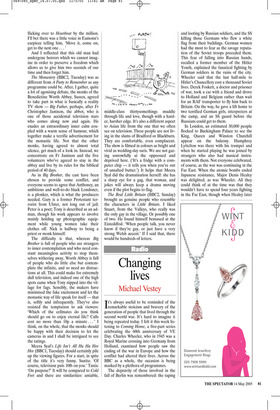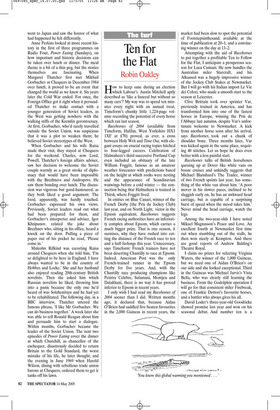Changing lives
Michael Vestey
It’s always useful to be reminded of the remarkable stoicism and bravery of the generation of people that lived through the second world war. It’s hard to imagine it being repeated today. I felt it this week listening to Coming Home, a five-part series celebrating the 60th anniversary of VE Day. Charles Wheeler, who in 1945 was a Royal Marine crossing into Germany from Holland, examined how people saw the ending of the war in Europe and how the conflict had altered their lives. Across the BBC as a whole, the occasion is being marked by a plethora of programmes.
The depravity of those involved in the fall of Berlin was remembered: the raping and looting by Russian soldiers, and the SS killing those Germans who flew a white flag from their buildings. German women had the most to fear as the savage reputation of the Soviet troops preceded them. This fear of falling into Russian hands, recalled a former member of the Hitler Youth, explained the fanatical fighting by German soldiers in the ruins of the city. Wheeler said that the last half-mile to Hitler’s Chancellery cost a thousand Soviet lives. Derek Foskett, a doctor and prisoner of war, took a car with a friend and drove to Holland and Belgium rather than wait for an RAF transporter to fly him back to Britain. On the way, he gave a lift home to two terrified German girls, interpreters at the camp, and an SS guard before the Russians could get to them.
In London, an estimated 30,000 people flocked to Buckingham Palace to see the King, Queen and Winston Churchill appear on the balcony. Humphrey Lyttelton was there with his trumpet and when he started playing he was joined by strangers who also had musical instruments with them. Not everyone celebrated, of course, as the war was continuing in the Far East. When the atomic bombs ended Japanese resistance, Major Denis Healey was delighted, as was Wheeler. All they could think of at the time was that they wouldn’t have to spend four years fighting in the Far East, though when Healey later went to Japan and saw the horror of what had happened he felt differently.
Anne Perkins looked at more recent history in the first of three programmes on Radio Four, Power Eating (Sundays), on how important and historic decisions can be taken over lunch or dinner. The meal theme is a bit of a thin peg, but the stories themselves are fascinating. When Margaret Thatcher first met Mikhail Gorbachev at Chequers in December 1984 over lunch, it proved to be an event that changed the world as we knew it. Six years later the Cold War ended. For once, the Foreign Office got it right when it persuaded Thatcher to make contact with a younger generation of Soviet leaders, as the West was getting nowhere with the walking stiffs of the Kremlin gerontocracy. At first, Gorbachev, who’d rarely travelled outside the Soviet Union, was suspicious that it was a plot to weaken them; he believed Soviet stereotypes of the West.
When Gorbachev and his wife Raisa made their visit, they stayed at Chequers for the weekend. Charles, now Lord, Powell, Thatcher’s foreign affairs adviser, saw her decision to welcome the Soviet couple warmly as a great stroke of diplomacy that would have been impossible with the Brezhnevs and Andropovs. He saw them bonding over lunch. The discussion was vigorous but good-humoured, as they both liked a good argument. The food, apparently, was hardly touched. Gorbachev expressed his own views. Previously, Soviet leaders read out what had been prepared for them, and Gorbachev’s interpreter and adviser, Igor Khripunov, related the joke about Brezhnev who, sitting in his office, heard a knock on the door. Pulling a piece of paper out of his pocket he read, ‘Please come in.’ Malcolm Rifkind was escorting Raisa around Chequers when she told him, ‘I’m so delighted to be here in England. I have always wanted to be in the country of Hobbes and Locke.’ She and her husband also enjoyed reading 20th-century British novelists. Then she asked him which Russian novelists he liked, throwing him into a panic because the only one he’d heard of was Solzhenitsyn and he had yet to be rehabilitated. The following day, in a BBC interview, Thatcher uttered the famous phrase, ‘I like Mr Gorbachev. We can do business together.’ A week later she was able to tell Ronald Reagan about him and persuade him to start a dialogue. Within months, Gorbachev became the leader of the Soviet Union. The next two episodes of Power Eating cover the dinner at which Churchill, as chancellor of the exchequer, disastrously decided to return Britain to the Gold Standard, the worst mistake of his life, he later thought; and the evening in June 1969 when Harold Wilson, dining with rebellious trade union barons at Chequers, ordered them to get ir tanks off his lawn.



































































 Previous page
Previous page